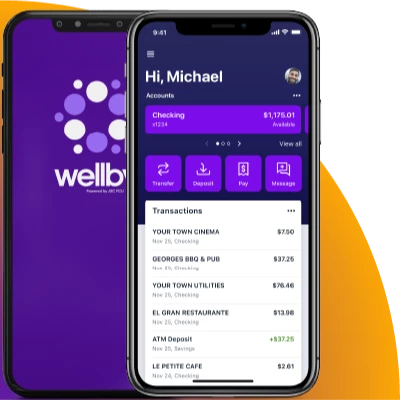December 23, 2024 | by Brian Truong

Expecting the Unexpected: The Smart Guide to Emergency Savings for Young Adults
January 9, 2024
By The Team at Wellby
With the recent economic environment, many people realize they need an emergency savings account as a safety net. You never know when prices will spike, your job will change, or unexpected events will exceed your monthly budget. Many younger adults who need a backup plan for the first time have never built an emergency fund. Fortunately, it's not as complex as it sounds.
A big part of planning ahead is to expect the unexpected. You never know when the next bad storm, broken appliance, or car accident might suddenly skyrocket your expenses - and it's good to have a rainy day fund just in case. Building your emergency savings can help you avoid falling behind on bills or rent, paying an unexpected medical cost, or getting home safely after a disaster. All it takes is putting a few dollars aside each week or month to create a baseline of financial security.
At Wellby, we believe in helping everyone achieve financial wellness. This article aims to provide insights and tips for young adults building their first emergency fund.
Keep Your Emergency Fund in a Proper Savings Account
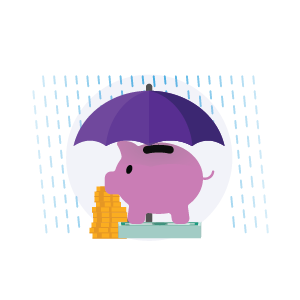 First and foremost, don't keep your emergency cash under your mattress. Emergency funds should be held in a savings account that builds up interest over time. Because your goal is to keep saving until there is a real emergency, an interest-bearing account allows you to increase the total funds available to you over time because the bank will pay you to keep a larger and larger stack of untouched cash in your account.
First and foremost, don't keep your emergency cash under your mattress. Emergency funds should be held in a savings account that builds up interest over time. Because your goal is to keep saving until there is a real emergency, an interest-bearing account allows you to increase the total funds available to you over time because the bank will pay you to keep a larger and larger stack of untouched cash in your account.
If you're starting with a small balance, open a free savings account alongside your regular checking account. Once you have a few hundred or more than a thousand dollars saved, look for a competitive high-yield interest account to earn interest on your savings even faster.
Don't Use a Checking Account or Credit Card for Emergency Funds
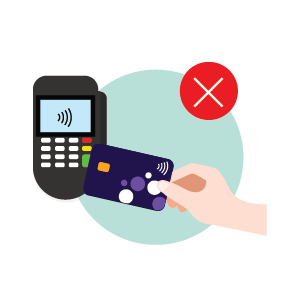 One common mistake many young people make is to let their checking account reach a high balance or even use a high-limit credit card as their emergency fund. There are two important reasons this isn't a best practice.
One common mistake many young people make is to let their checking account reach a high balance or even use a high-limit credit card as their emergency fund. There are two important reasons this isn't a best practice.
First, your emergency cash should be kept separate from your everyday money so that you always know exactly how much is saved for emergencies and are never tempted to spend it. With a savings account, you'll need to take extra steps to spend the emergency savings, which will help protect it.
Second, neither checking accounts nor credit cards benefit from accruing interest or dividends. You won't get any of the long-term benefits of saving unless you use an actual savings account designed to pay you back as you save more and more.
Using a credit card can even lead to additional interest expenses if you can’t pay them off at the end of the month, which is the exact opposite of your goal.
Refer to Your Monthly Budget When Deciding How Much to Save
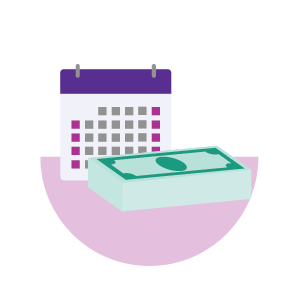 Many financial advisors recommend an emergency fund for three to six months of expenses. For example, if you suddenly need to move, lose your job, or are injured and unable to work, your emergency fund could keep you afloat long enough to make new plans and get your income back on track.
Many financial advisors recommend an emergency fund for three to six months of expenses. For example, if you suddenly need to move, lose your job, or are injured and unable to work, your emergency fund could keep you afloat long enough to make new plans and get your income back on track.
Use your monthly budget as a guidepost when deciding how much money should be in your emergency savings account. Include your rent, utilities, groceries, gasoline for commuting and errands, insurance, debt payments, and other expenses. Calculate how much you usually pay to live comfortably each month and multiply it by six. This amount will be your savings goal.
The final number may seem like a lot, but you can start building toward that goal in little steps. You might be surprised how fast your savings account grows if you ensure that a little from each paycheck is added to the fund.
Start by saving up just for one month of expenses. Then, build your fund to three months of expenses. Once you reach six months’ worth of expenses in your account, you can relax and let the interest (which will then be considerable) grow the account on its own.
You can also keep saving to build a nest egg or open a second savings account for other goals while protecting your emergency fund.
Automating Your Savings Can Make it Easier
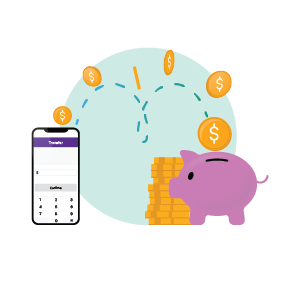 Another common challenge is remembering to save and ensuring money gets to your savings account. Anyone who is naturally absent-minded, very busy, or prone to impulse spending can benefit from savings automation. One of the best ways to save is to automate your savings with every paycheck.
Another common challenge is remembering to save and ensuring money gets to your savings account. Anyone who is naturally absent-minded, very busy, or prone to impulse spending can benefit from savings automation. One of the best ways to save is to automate your savings with every paycheck.
You can use the features of your bank to automatically transfer a certain amount that you can afford from your checking to your savings account with the arrival of each paycheck. Or you can set up a small direct deposit that deposits money from your paycheck to your savings account with every paycheck, and the remaining amount will be deposited to your checking account.
Like tax deductions, automating will make sticking to your savings goals much easier because the money is “out of sight, out of mind.” You will benefit from saving consistently without remembering to make the transfer.
The psychology behind this strategy is that if you automatically save a designated amount from each paycheck, you'll look at your budget in a post-savings light. You will mentally calculate expenses without seeing the amount you're supposed to save in your checking account, waiting to be spent. Making sure the money you want to set aside from your emergency fund each month is automatically deposited or transferred can help prevent you from impulse spending.
Build an Emergency Fund That Fits Your Goals
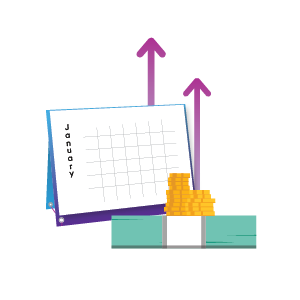 Of course, you don't have to reach your six-month savings goal immediately. Any savings is better than none at all. The importance of starting your emergency fund is far greater than any specific savings goal. In closing, we want to share a few final points to help young adults achieve the financial security of a growing emergency fund.
Of course, you don't have to reach your six-month savings goal immediately. Any savings is better than none at all. The importance of starting your emergency fund is far greater than any specific savings goal. In closing, we want to share a few final points to help young adults achieve the financial security of a growing emergency fund.
Don't Break the Bank
Saving for emergencies is important, but don't pull so much from your paycheck that your monthly finances are harmed. You shouldn’t miss your debt or credit payments or go without essentials just to start saving. Calculate your minimum monthly budget that still fulfills all your needs and obligations. Then, save whatever is left.
If you have extra money left over by making practical and lean choices (like cooking at home instead of eating out), you can save that, too. Every time you save money by making a sound financial choice, transfer the amount you saved into your savings account. With each smart decision, reward yourself for not spending by increasing your financial safety net.
But don't neglect your finances to build your savings more quickly.
Avoid Over-Saving
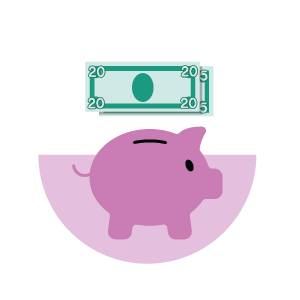 Simply put, don't put too much into your emergency fund. An emergency fund is meant to be cash you can quickly access. Typically, this is kept in a low-interest savings account.
Simply put, don't put too much into your emergency fund. An emergency fund is meant to be cash you can quickly access. Typically, this is kept in a low-interest savings account.
Because of the low interest, it's wise to shift your focus once you hit your target amount. Instead of adding more to this fund, consider putting your money into accounts that generate higher returns, like retirement accounts. Over time, these investments can grow significantly.
After meeting your emergency fund goal, think about other saving strategies. You might want to increase your retirement contributions, invest in stocks or bonds, or start saving for big future expenses.
Save Your Funds for Real Emergencies
Finally, only dip into your emergency savings account for real emergencies. Major car repairs, unexpected health expenses, loss of income, or travel emergencies qualify. However, try to manage more minor expenses out of your monthly budget, like wardrobe upgrades and small repairs.
Start Your Emergency Savings Fund with Wellby
Anyone can build emergency savings and create a safety net. Whether you're living solo, with roommates, a partner, or supporting a family, you can ensure that you're not only covering your monthly expenses but also able to tuck away a little with each paycheck until you have a nice rainy day fund to fall back on.
At Wellby, we’re passionate about helping people prosper, and we offer savings account options that fit your needs so you can achieve your goals. Open your account online or visit a local branch to get started today.
Related Topics
The Team at Wellby is a diverse group that is here to help you find the right financial solutions for your unique goals and budget. Our passion is people: our members, team members, and the communities we serve. We help people find solutions that support their financial well-being, allowing them to dream and prosper.
Related articles you might like
August 5, 2024 | by Brian Truong
How to Automate Your Investments and Savings
July 2, 2024 | by Brian Truong





